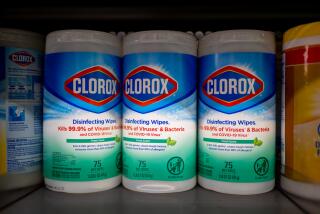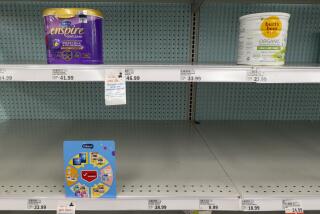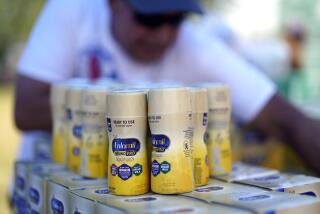Chiron’s Profit Survives Woes
- Share via
Chiron Corp., under fire for causing the flu shot shortage, reported a third-quarter profit Wednesday despite the write-down of its entire Fluvirin vaccine inventory.
In announcing the results, Chief Executive Howard Pien said in a conference call that the company was focused on designing a “remediation plan” for its troubled factory in Britain so Chiron could return to the U.S. market “as soon as feasible.”
British regulators suspended the license of Chiron’s Liverpool plant on Oct. 5 because of manufacturing problems, making it impossible for the company to ship more than 40 million flu vaccine doses to the U.S. -- nearly half the nation’s supply.
Pien said that the company was examining its entire manufacturing process in Liverpool, including the system it had in place to prevent bacterial contamination and maintain quality. Chiron had “two fruitful meetings” with British regulators, Pien said, and planned to hire consultants to help it get the Liverpool factory in order.
Pien declined to answer any questions about its flu vaccine, citing “the current litigious environment.”
Chiron is facing investigations by the Justice Department and the Securities and Exchange Commission over its role in the vaccine shortage. The company also faces at least seven shareholder suits alleging that Chiron misled investors about its ability to supply Fluvirin, the company’s biggest product.
On Aug. 25 Chiron reported bacterial contamination affecting 4 million doses, but said it believed the rest of the vaccine was safe.
However, the Medicines and Health Regulatory Agency, the counterpart to the U.S. Food and Drug Administration, found that Chiron failed to follow good manufacturing practices, casting doubt on the safety of the remaining 48 million doses.
The FDA finished its own inspection of Chiron’s plant last week and in effect concurred with the British. The U.S. agency said it had found evidence of contamination and could not guarantee that any vaccine there was safe for use.
Analysts said that Chiron’s problems sounded extensive.
“As I feared, the company has a pretty long list of things it has to remedy to get the facility running,” said Geoffrey Porges of Sanford C. Bernstein & Co. Porges said that Pien’s comments made him less sure that Chiron could return to the U.S. flu vaccine business in 2005.
However, Thomas Shrader of Harris Nesbitt said he believed Pien was simply being cautious, not only because of the company’s legal problems but also because he did not want to say anything that might offend drug regulators in Britain and the U.S.
“He is bending over backwards to get regulators to tell him what he needs to do,” Shrader said.
Chiron, based in Emeryville, Calif., had third-quarter income of $24 million, or 13 cents a share, contrasted with a loss of $20 million, or 11 cents, for the same quarter of 2003, when the company took a $142 million charge related to its acquisition of PowderJect Pharmaceuticals, the previous owner of the Liverpool plant.
Chiron’s results in the latest quarter were hurt by a $91-million write-down of its Fluvirin inventory.
The company said revenue was $524 million, down 3% from $540 million in the 2003 quarter, when the company had $103 million in Fluvirin sales.
Chiron’s results were announced after the stock market close. In regular trading on Nasdaq on Wednesday, Chiron shares closed at $31.13, off 73 cents.
More to Read
Inside the business of entertainment
The Wide Shot brings you news, analysis and insights on everything from streaming wars to production — and what it all means for the future.
You may occasionally receive promotional content from the Los Angeles Times.










